
home

maglog

email

archive

radio

viridian

links

me
|
The extremely digestible

first
quarter - second quarter -
december 5, 2000
It's
a very special Maglog...
A
Library Maglog Spectacular!
november 29, 2000
The
Alliance is right: there's an Asian Invasion.
november 8, 2000
An
admission about electoral colleges
november 2, 2000
"Vote
for Dubya - Messenger of the Gods" : ties together the speaking skills
of the presidential candidates, research in brain morphology, ideas on
the self and oral tradition, and Woody Allen and brings them all together
as evidence that we might be de-evolving.
october 23, 2000
A
call to inventory all the planet's living creatures. Did you know that
less than 5% are known?
october 18, 2000
"I
am anti-Canadian" : a beautiful retort to the Joe Canada beer ads.
september 12, 2000
using
The Simpsons to illustrate the complexities of Quebec, language, class,
and racism and why so many Canadians golf left-handed
<I burn out right about here>
<rememeber this is in reverse chronological order>
September, 2000
my fave = my
fave
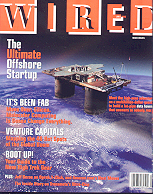 |
WIRED
: July 2000
It's back! The Wired Magazine
that I loved. Ok, it's not perfect but it's got more mind-bending articles
in this issue than the last three combined. It starts out ambitious and
goofy. In April, Wired printed
an essay by Bill Joy, the co-founder of Sun Microsystems, in which
he admitted fears from such future developments of genetics, nanotechnology
and robotics. To me, the article didn't break new ground but if you don't
want to take my word for it, read the comments of the contributors who
weigh in on the article that are printed in this issue. Some of them are
good for a laugh. My fave: "We have to think about Joy's essay as a competing
idea in a broad marketplace of ideas about technology. To be successful,
though, he needs to form a startup aimed at disseminating his message."
Ugh. Luckily Wired promptly redeems itself with a good piece on the web's
free advice sites, like epinions.
Then WIRED interviews physicist Thomas Gold
who takes on established geology and claims that crude oil is created by
a biological process in the earth's core, and is thus a renewable natural
resource. After you unwrap your mind around that thought, you can read
about the newest competitor to Intel, Transmedia, which seeks to make computer
chips a hybrid of software and hardware. But don't invest your life savings
until you read about the promise of molecular electronics.
Add a fun piece on new entertainment 'experiences' in development, a Bruce
Sterling on high tech chairs, a brief interview with Amazon's Jeff Bezos,
and the cover piece on the history of Sealand - an offshore structure in
the North Sea that just might be sovereign enough to host the world's foremost
data - and you have a really good read. |
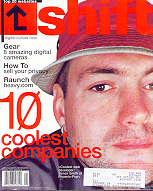 |
Shift:
July / August 2000
There's not a real theme
to this issue, but there does seem to be a common thread: how the IT industry
has changed the workplace. There's a report for Wall Street that lower
Manhattan is learning to loosen up in order to better retain its talent
from the clutches of high-tech start-ups. And then there's the required
Shift list : the 10 'coolest' indi companies to work for. But more disturbing
is the piece called 'Sumo wrestling for the man' in which the outlandish
perks that some IT companies spill on their geeky employees to keep them
around. I found the extravagance it described really disturbing. Are geeks
turning into a new spoiled and intolerable class? It doesn't look
good. Especially when you read that the son of Disney head Michael Eisner
co-owns a company called Romp that specialized
in rude and tasteless comedy. With millions of start-up funding. Smaller
bits include a review of video game chuchu rocket, music group Belle and
Sebastian, movie 8 1/2 women (which is also a nice short piece on
misogeny in film), and film maker Miguel Arteta. One item that I found
was dubious was the ranking of User
Friendly as the number one ranked web site by Shift. What were they
thinking? (Doonesbury, I'd understand). The good news is that Shift seems
to cover high tech well. The bad news is that they are making me learn
to hate it. |
 |
Colors:
38, 39; June-September 00
When I brought this double
issue of Colors up to the counter at the bookstore, the sales clerk focused
intently at the cover and after a moment told me that she had seen the
same photograph in GQ magazine. I said that it was possible as Colors often
makes use of stock photography. What I didn't say that it was surprising
that it would have to resorted to stock photos for this issue as it's theme
is fashion. You would expect more from a publication that is sponsored
by fashion house Benetton. As I did. And I was very disappointed. Colors,
at its best, uses the juxtaposition of photographs from around the world
to bring to light a similarity or disparity that if often surprising and
illuminating. There's little of such surprises in this issue. Instead,
there are many photographs that hammer out the same idea: people around
the world love uniforms. I'm chalking up this poor issue on the fact that
photographic creative force,
Toscani
has left Benetton. |
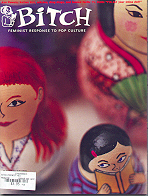 |
Bitch
: Issue 12 "Bitch for president"
I have had friends who've
asked me whether I've read Bitch and until recently, I've said no. You
see, Bitch is a "Feminist Response to Pop Culture" and since I have been
trying to avoid Pop Culture I thought it would be best to avoid Bitch as
well. My mistake! Bitch is feminism that keeps itself sharp by using Pop
Culture not unlike how a knife uses a sharpening stick. What keeps the
analysis entertaining is Bitch's sense of humour (my fave: "Putting the
'anal' back into analysis") and the fact that the writers aren't afraid
as coming off as, well, bitches. I also liked the fact that Bitch targets
sexist ads and dubious products with both criticism and a mailing address
so you too can write angry letters. And there's lots of long juicy articles:
a comparison of two "how to date" books, a reading of women's size
charts, an interview with Action Girl cartoonist Sarah Dyer, an examination
of the entomology of body hair removal products, an interview with Village
Voice music critic Ann Powers, the drag-king subculture, a bemoaning of
the lack of butch dykes on tv, a critical comparison of two "guy tv" shows
- The Man Show and The X Show,
an almost scholarly
reading of the idea of witchcraft in television and movies, another
interview - this time with playwright Paula Kamen, and a
first person account of the dealing with the trials of men with Asian-obsessions.
I really like Bitch. It covers playgrounds of thought that no one else
that I know of is playing in and its not afraid to be smart. What a bitch. |
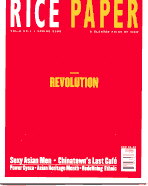 |
Rice
Paper : Spring 2000
Rice Paper is a west-coast
Canadian cultural product geared to those Asian and of Asian descent. RP
tackles the issues from an artist's viewpoint so the bulk of the magazine
is made up of arts announcements, book reviews, theatre and dance reviews,
poetry, and submission alerts. There are articles as well but they are
quite short and some of them appear as the result of research for larger
artistic projects. Article subjects include: feeling guilty about ethnic
media, Dr Feng Shan Ho - a Chinese diplomat who issued life-saving visas
to thousands of Jews during WWII, being a Chinese School dropout, Asian
sexy men (a comedian and an actor), the struggles and triumphs of Gim Wong
- a Chinese Canadian War Vetran, speculationn that Buddhist monks visited
North America around 499 BC and the sad story of an all-Chinese leper colony
in the early days of British Columbia. RP is as its best when it is telling
stories of remarkable people. But I wasn't completely won over by RP -
I think they should take their issues out of the art galleries and into
the streets. Actually, this may be the whole point of RP. |
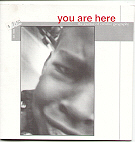 |
you
are here: fall 1999
I was lent this copy of
this "journal of creative geography" and if you want your own, you're best
to contact the Dept. of Geography from The University of Arizona. you
are here is a journal of an artistic bent as opposed to a "scholarly
publication" which is why I dig it. You see, I hold a personal philosophy
that 'where you are' is an important part of 'who you are' and that this
important quality is being drown out by the noise of the TV and neon lights
of Generica.
you are here seems to be attempt to fight this white
noise. There's a letter from Kenya, poetry, a conversation with author
Barbara Kingsolver on the where of literature, field notes from a prison
yard, and my fave, the mental maps of Appalachian Train hikers. Stand in
the place where you live. Now face north. Think about direction. Wonder
why you haven't before... |
first
quarter - second quarter - third quarter
- fourth quarter
the
rain barrel
extremely
digestible maglog
or
the
1999 rain barrel
extremely
digestible maglog archive
|




